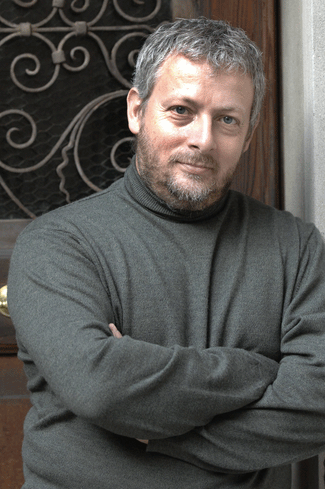Biondi and Europa Galante present an intimate, enjoyable Baroque program

The Logan Center got its first real classical test-drive Tuesday night, as violinist Fabio Biondi and his Europa Galante ensemble performed at the University of Chicago’s new venue.
It turned out to be less of a tryout than it looked on paper, since the program offered only a quintet, not Biondi’s full Baroque orchestra that one might think was appearing by the billing.
Still with vital and idiomatic performances and an offbeat mix of timbres (two violins, cello, theorbo and harpsichord), the University of Chicago Presents event delivered another successful outing for its attractive new space. The edgy timbres emerged bracingly with a range of hues, and, if the string sound was a bit on the dry side, it seemed to come from the period instruments, not the acoustic.
The program was built largely on titled sonatas—not solos or duos in the 19th-century sense but for small chamber ensemble in Baroque style—with a nice mix of familiar and lesser known composers represented.
Biondi remains one of the leading Baroque stylists of our day. He doesn’t seduce with flash for its own sake but wields his sterling technique with integrity, putting himself and his gifted colleagues (cellist Antonio Fantinuoli, theorbist Giangiacomo Pinardi, harpsichordist Paola Poncet and violinist Andrea Rognoni). entirely at the service of the music.
With Biondi as primes inter pares, the Italian players served up spirited and incisive playing throughout the evening. Biondi showed his bravura solo chops in two sets of variations on the popular La Folia theme, by Vivaldi and Corelli, with fiddle playing fiery and tender by turns. The timbre of the gut strings and occasional bow scrape added a tart asperity to the music-making.
Couperin’s Grande Sonata “Le Parnasse, ou l’Apotheose de Corelli” has a rather quaint program with each of its seven movements painting a vision of Corelli ascending to Parnassus entering the gates, drinking, falling asleep and being given an honored seat next to Apollo to general rejoicing. Despite the celestial events, the music remains stately and galant in French Baroque style—even in Corelli’s elbow-bending—and Biondi delivered graceful playing throughout bringing out the fantasy element, with especially mellow and tender pianissimos.
The lesser known composers proved a fascinating discovery. The program notes seem to disparage Michele Mascitti as a pale imitator of Corelli, but his “Psyche” Sonata, Op. 5, no. 12, is a real find, painting the mythic fable in a ten-movement suite. The violin is to the fore here again and Biondi was inspired throughout, bristling with intensity in the insistent opening section and bringing an intimate delicacy to the more interior sections.
Two Spanish Baroque composers were heard, meriting the event’s inclusion in Chicago’s long-running Latino Music Festival. The Trattenimento armonico No. 5 of the nobleman Francisco Jose de Castro is an attractive work with an easy-going lilt and received graceful advocacy.
More striking was Jose Herrando’s Sonata for violin and bass continuo with the diverting title, “The garden of Aranjuez in the time of Spring with diverse songs of birds and other animals.”
In his three-movement sonata, Herrando rivals Vivaldi with his avian musical onamotopeia. Biondi put across the piquant bird calls—canary, quail, dove, nightingale— and other nature effects with great charm, unerring taste and extraordinary control, avoiding kitsch while highlighting the skill and imagination of Herrando’s writing.
Lively encores of Marco Uccellini’s Gran Battaglia and Leclair’s Tambourin provided an exhilarating wrap on an enjoyable Baroque evening.
Posted in Performances




